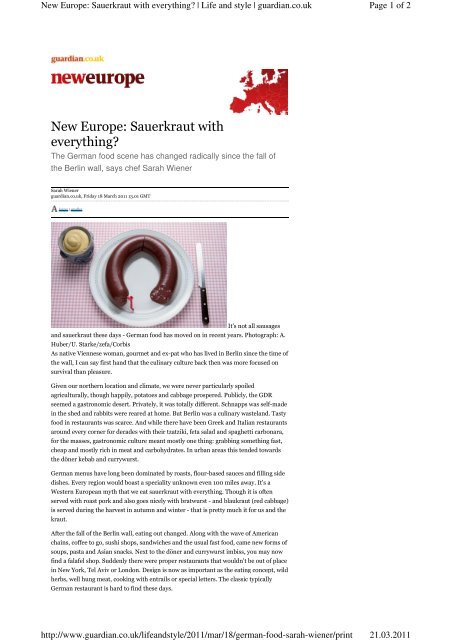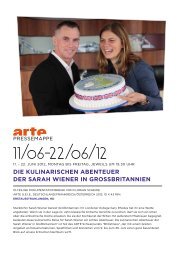New Europe: Sauerkraut with everything? - Sarah Wiener
New Europe: Sauerkraut with everything? - Sarah Wiener
New Europe: Sauerkraut with everything? - Sarah Wiener
You also want an ePaper? Increase the reach of your titles
YUMPU automatically turns print PDFs into web optimized ePapers that Google loves.
<strong>New</strong> <strong>Europe</strong>: <strong>Sauerkraut</strong> <strong>with</strong> <strong>everything</strong>? | Life and style | guardian.co.uk<br />
<strong>New</strong> <strong>Europe</strong>: <strong>Sauerkraut</strong> <strong>with</strong><br />
<strong>everything</strong>?<br />
The German food scene has changed radically since the fall of<br />
the Berlin wall, says chef <strong>Sarah</strong> <strong>Wiener</strong><br />
<strong>Sarah</strong> <strong>Wiener</strong><br />
guardian.co.uk, Friday 18 March 2011 13.01 GMT<br />
larger | smaller<br />
It's not all sausages<br />
and sauerkraut these days - German food has moved on in recent years. Photograph: A.<br />
Huber/U. Starke/zefa/Corbis<br />
As native Viennese woman, gourmet and ex-pat who has lived in Berlin since the time of<br />
the wall, I can say first hand that the culinary culture back then was more focused on<br />
survival than pleasure.<br />
Given our northern location and climate, we were never particularly spoiled<br />
agriculturally, though happily, potatoes and cabbage prospered. Publicly, the GDR<br />
seemed a gastronomic desert. Privately, it was totally different. Schnapps was self-made<br />
in the shed and rabbits were reared at home. But Berlin was a culinary wasteland. Tasty<br />
food in restaurants was scarce. And while there have been Greek and Italian restaurants<br />
around every corner for decades <strong>with</strong> their tzatziki, feta salad and spaghetti carbonara,<br />
for the masses, gastronomic culture meant mostly one thing: grabbing something fast,<br />
cheap and mostly rich in meat and carbohydrates. In urban areas this tended towards<br />
the döner kebab and currywurst.<br />
German menus have long been dominated by roasts, flour-based sauces and filling side<br />
dishes. Every region would boast a speciality unknown even 100 miles away. It's a<br />
Western <strong>Europe</strong>an myth that we eat sauerkraut <strong>with</strong> <strong>everything</strong>. Though it is often<br />
served <strong>with</strong> roast pork and also goes nicely <strong>with</strong> bratwurst - and blaukraut (red cabbage)<br />
is served during the harvest in autumn and winter - that is pretty much it for us and the<br />
kraut.<br />
After the fall of the Berlin wall, eating out changed. Along <strong>with</strong> the wave of American<br />
chains, coffee to go, sushi shops, sandwiches and the usual fast food, came new forms of<br />
soups, pasta and Asian snacks. Next to the döner and currywurst imbiss, you may now<br />
find a falafel shop. Suddenly there were proper restaurants that wouldn't be out of place<br />
in <strong>New</strong> York, Tel Aviv or London. Design is now as important as the eating concept, wild<br />
herbs, well hung meat, cooking <strong>with</strong> entrails or special letters. The classic typically<br />
German restaurant is hard to find these days.<br />
http://www.guardian.co.uk/lifeandstyle/2011/mar/18/german-food-sarah-wiener/print<br />
Page 1 of 2<br />
21.03.2011
<strong>New</strong> <strong>Europe</strong>: <strong>Sauerkraut</strong> <strong>with</strong> <strong>everything</strong>? | Life and style | guardian.co.uk<br />
With my Berlin restaurant, Das Speisezimmer I try to run a responsible and sustainable<br />
kitchen using small and local producers, unusual and heritage varieties of vegetables.<br />
Jerusalem artichokes, Japanese potato and Linumer veal are as important as renewable<br />
energy and recycled paper for the menus. Others are trying their hand at molecular<br />
gastronomy and particularly expensive caviar. These days you can also find vegetarian<br />
food in nearly all cities.<br />
German society is paradoxical: we are putting more expensive oil in our cars than our<br />
bodies, while insisting on no GM crops. Groceries in Germany are among the cheapest<br />
in <strong>Europe</strong>; a loaded plate is too often seen as a sign of quality. But a lot is happening in<br />
the German food scene thanks to regional producers who have moved away from the<br />
agricultural industry and an ever growing community for whom food is more than just<br />
fuel. Foodies who are interested in the origin of the meat and vegetables they eat, who<br />
have banned stock cubes and ready-made sauces from their kitchens and celebrate <strong>with</strong><br />
outstandingly cooked five-course meals in a restaurant.<br />
• <strong>Sarah</strong> <strong>Wiener</strong> is one of Germany's top chefs and restaurateurs<br />
guardian.co.uk © Guardian <strong>New</strong>s and Media Limited 2011<br />
http://www.guardian.co.uk/lifeandstyle/2011/mar/18/german-food-sarah-wiener/print<br />
Page 2 of 2<br />
21.03.2011




